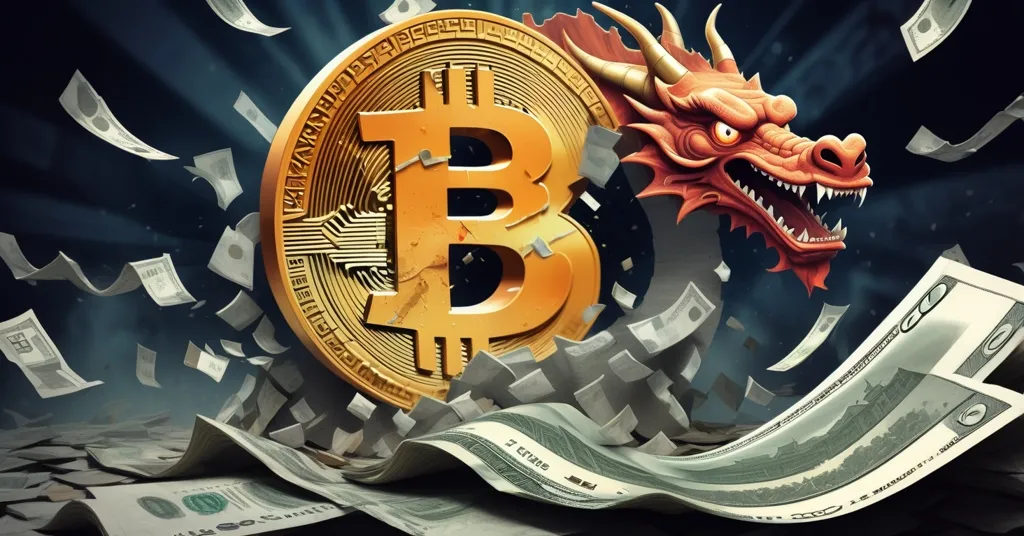Bitcoin Gains Traction as Chinese Stocks Surge and Fiat Currency Wars Intensify

Bitcoin’s Rise Amid Chinese Stock Surge and Fiat Currency Wars
Chinese stocks are soaring to heights not seen since 2021, fueled by tech giants and a tenuous calm in U.S.-China trade spats. Yet, as accusations of currency manipulation expose the rot in fiat systems, I and decentralized finance emerge as a defiant alternative. Are we witnessing the cracks in centralized money that could propel crypto into the mainstream?
- Market Momentum: Hang Seng China Enterprises Index up 1.2%, with a 26% year-to-date gain driven by Meituan and Tencent.
- Fiat Fallout: Claims of China suppressing the yuan deepen Europe’s trade deficits, spotlighting fiat’s flaws.
- Crypto’s Call: Currency wars bolster Bitcoin’s case as a neutral, unmanipulated store of value.
Chinese Stock Surge: A Fragile Boom
The Hang Seng China Enterprises Index (HSCEI), a key benchmark for major Chinese firms listed in Hong Kong, leapt by as much as 1.2% on a recent Wednesday, marking its strongest close in over four years. Tech powerhouses like Meituan and Tencent Holdings Ltd. are steering this surge in Chinese stocks, while the broader Hang Seng Index, reflecting Hong Kong’s overall market health, climbed 1%. So far this year, HSCEI has roared ahead with a 26% gain, dwarfing the S&P 500’s modest 7% and the MSCI Asia Pacific Index’s 15%. Even on mainland China, the CSI 300 Index has notched a 5% rise year-to-date. This rally follows a turbulent April when U.S. tariff threats under Donald Trump sent shockwaves through markets. A temporary tariff pause and upcoming talks in Stockholm between U.S. Treasury’s Scott Bessent and Chinese officials have sparked cautious optimism.
Beyond tech, Beijing’s muscle-flexing adds fuel to the fire. A massive $170 billion hydropower dam project in Tibet has lifted confidence in construction and power sectors, with stocks like Anhui Conch Cement and Power Construction Co. of China hitting 10% daily gains. Even coal and liquor stocks are riding the wave, with the CSI Coal Index up nearly 7% and liquor shares climbing over 3%. Traders are also pinning hopes on China’s Politburo meeting in July 2025 for economic policy signals, especially as Beijing grapples with deflation and industrial overcapacity, as detailed in discussions about the Hang Seng rally’s impact. But as Ting Lu, chief China economist at Nomura, warns, this bull market euphoria might be a mirage.
“Investors usually don’t care much about the real economy in such a bull market, especially with the rise of their confidence in Beijing’s capability in handling any economic cracks,” Lu notes. Yet, he cautions that if momentum fades, focus could snap back to persistent issues by late 2025.
While the Hang Seng roars like a dragon, is it breathing smoke or fire? State-driven stimulus and infrastructure bets can prop up markets for now, but they often mask deeper systemic flaws—flaws that echo in the very nature of centralized control over money itself.
Currency Wars: Fiat’s Dirty Secret
Behind the stock market sheen lies a grittier tale. A study from the German Economic Institute in Cologne accuses China of currency manipulation, alleging Beijing keeps the yuan artificially weak to boost export competitiveness. For the unversed, currency manipulation often involves a central bank intervening in foreign exchange markets—think buying or selling foreign reserves like U.S. dollars—to control a currency’s value. A weaker yuan means Chinese goods are cheaper abroad, giving exporters an edge. According to researcher Juergen Matthes, a trade policy expert at the Institute, the euro-yuan exchange rate has remained suspiciously static despite Europe’s production costs skyrocketing since 2020 due to supply chain disruptions and energy crises, as explored in a recent German study on yuan undervaluation.
“That suggests likely intervention by the central bank,” Matthes argues, adding, “How this is done, exactly, no one outside China knows.”
The impact is brutal. Since 2020, the euro has appreciated over 40% against the yuan in real terms, meaning European goods are pricier in China while Chinese imports flood Europe at bargain rates. This has widened the euro zone’s trade deficit with China, hammering exporters. Matthes points out a darker ripple effect: low Chinese prices, driven by yuan undervaluation, are so attractive that European firms—especially in sectors like automotive—are sourcing intermediate goods from China, fueling deindustrialization at home.
“The euro has become ‘collateral damage,’” Matthes laments, underscoring the broader fallout of China’s opaque currency practices.
Beijing denies “competitive devaluation,” claiming their managed float system reflects market forces. But skepticism runs deep. The U.S. Treasury echoed this distrust in a recent statement, noting China stands out “in its lack of transparency around its exchange rate policies and practices.” This isn’t a new beef—Trump branded China a currency manipulator in his first term, a label lifted in 2020 after a trade pact, but the bad blood lingers. For Europe and the U.S., fiat currency isn’t just money; it’s a geopolitical weapon, and trust in these systems is fraying fast.
Bitcoin’s Case Amid Fiat Chaos
Enter Bitcoin, the rebel born from distrust in centralized money. For those new to the game, Bitcoin is a digital currency created in 2009 by the mysterious Satoshi Nakamoto. It runs on a blockchain—a public, tamper-proof ledger where transactions are verified by a global network of miners through a process called proof-of-work. Unlike the yuan or euro, no government or central bank can tweak Bitcoin’s value to favor trade balances. With a hard cap of 21 million coins, it’s a giant middle finger to inflationary fiat systems where printing money is as easy as a politician’s promise, as explained in this detailed overview of Bitcoin.
When trust in state-controlled currencies erodes—whether it’s China allegedly rigging the yuan or Europe suffering as collateral damage—Bitcoin’s allure as a borderless, neutral store of value sharpens. Look at history: during Venezuela’s hyperinflation crisis in 2018, Bitcoin’s price and adoption spiked locally as citizens fled a collapsing bolívar. Today, as fiat currencies become pawns in global trade chess, Bitcoin offers an opt-out, a perspective often discussed in communities like Reddit forums on Bitcoin as a fiat alternative. No politburo or treasury can devalue your sats to juice exports. Holding Bitcoin means owning your financial sovereignty, a concept that’s pure blasphemy to centralized systems.
But let’s not paint this as a fairy tale. Bitcoin’s volatility can make your stomach churn faster than a stock market crash—price swings of 20% in a week aren’t rare. Scalability is another kick in the teeth; Bitcoin processes about 7 transactions per second compared to Visa’s thousands, making it impractical for daily coffee runs. Energy debates around mining persist, though innovations like renewable-powered mining farms are chipping away at that critique. Still, playing devil’s advocate, isn’t this fiat mess a glaring neon sign to push past these hurdles? When central banks play god with your purchasing power, a bumpy road to decentralized money starts looking like the only path worth taking, especially when considering the effect of Chinese stock surges on Bitcoin’s value.
DeFi and Beyond: Filling the Gaps
Bitcoin might be the unassailable king of sound money—digital gold no central bank can touch—but it doesn’t cover every base. That’s where other blockchains like Ethereum step in with decentralized finance, or DeFi. For the uninitiated, DeFi refers to financial applications built on blockchains like Ethereum, enabling peer-to-peer transactions without banks as middlemen. Think lending, borrowing, or trading directly from your wallet, powered by smart contracts—self-executing code that automates agreements, as outlined in this guide to decentralized finance solutions.
How does this tie to currency wars? European firms drowning under trade deficits could, in theory, use DeFi protocols to bypass fiat exchange rate distortions. Take MakerDAO, a prominent DeFi project on Ethereum, which issues DAI, a stablecoin pegged to the U.S. dollar but backed by crypto collateral, not central bank whims. Exporters could settle cross-border trades in DAI, sidestepping the euro-yuan mismatch. It’s not a silver bullet—stablecoins face regulatory scrutiny and technical risks like smart contract bugs—but it’s a niche Bitcoin doesn’t fill, nor should it. Bitcoin maximalists like myself see BTC as the ultimate hedge, but Ethereum’s programmable money carves out a complementary role in this financial revolution.
China’s Digital Yuan vs. Bitcoin’s Freedom
China’s own flirtation with blockchain throws a curveball into this saga. Despite banning Bitcoin trading and mining in 2021, Beijing has been piloting the digital yuan, a central bank digital currency (CBDC), in cities like Shenzhen. Unlike Bitcoin, the digital yuan—also called e-CNY—is fully controlled by the People’s Bank of China, tied to state surveillance and lacking any semblance of privacy or decentralization. It’s fiat with a tech makeover, not a disruptor. Reports suggest it’s being tested for everything from public transport payments to government subsidies, with over 260 million wallets created by early 2023.
This reeks of control freakery. A digital yuan could enable real-time tracking of every transaction, a dystopian dream for authoritarians and a nightmare for privacy advocates. Bitcoin, by contrast, offers pseudonymity—your transactions are public on the blockchain, but your identity isn’t unless you tie it to your wallet. China’s CBDC validates blockchain’s utility, sure, but through a lens of centralization that undermines everything crypto stands for. Could it nudge curious minds toward true decentralization? Perhaps, though I wouldn’t bet my stack on Beijing loosening its grip. This stark contrast only sharpens Bitcoin’s ethos of freedom over fiat’s shackles, a topic often debated in relation to how currency manipulation impacts Bitcoin adoption.
Challenges and the Road Ahead
Global regulatory landscapes add another layer of grit to crypto’s journey. China’s hostility is well-known, but elsewhere, the picture varies. In the U.S., the SEC’s ongoing tug-of-war over Bitcoin ETFs signals cautious acceptance mixed with overreach, while the EU’s Markets in Crypto-Assets (MiCA) framework aims for clarity but risks stifling innovation with compliance burdens. Adoption isn’t just a tech problem; it’s a bureaucratic slog. And let’s not even entertain the clowns peddling “Bitcoin to $1 million by next Tuesday” nonsense—save it for your crystal ball convention. We’re here for real talk, not hype.
Bitcoin won’t topple the yuan or euro overnight. Mass adoption is a marathon, not a sprint, paved with volatility, tech barriers, and political headwinds. Yet, as Chinese stocks ride state-fueled highs and currency wars expose fiat’s dirty underbelly, the case for opting out of centralized systems screams louder. State intervention in markets mirrors the same control over money—a control Bitcoin defies, as noted in broader discussions on Bitcoin’s role against fiat manipulation. If fiat systems keep stumbling, will enough people turn to decentralized money before the next crisis hits?
Key Questions and Takeaways on Bitcoin Amid Global Currency Tensions
- How do claims of China’s currency manipulation boost Bitcoin’s relevance?
Allegations of suppressing the yuan reveal fiat’s vulnerability to government interference, positioning Bitcoin as a decentralized alternative immune to such manipulation. - Can Bitcoin or DeFi address trade imbalances like those hitting Europe?
Bitcoin serves as a neutral store of value for cross-border wealth preservation, while Ethereum’s DeFi protocols, like MakerDAO’s DAI stablecoin, could enable trade settlements free from fiat rate distortions. - What obstacles stand in Bitcoin’s way during fiat currency disputes?
Volatility, scalability limits, and regulatory pushback—especially China’s crypto bans—slow Bitcoin’s rise as a fiat alternative, despite growing distrust in centralized money. - Is China’s digital yuan a rival or opportunity for decentralized crypto?
It’s more rival than opportunity; a state-controlled CBDC clashes with decentralization, though it might indirectly highlight blockchain’s potential and push interest toward Bitcoin’s freedom-focused model.



